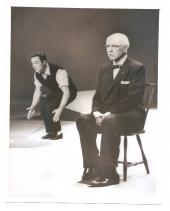Film noir 'Elena': a grim Russian tale of post-crime, pre-punishment
Intramural class warfare is the name of the game in "Elena," a provocative film-noir tale of post-Putin Russia, set in a palatial glass-and-chrome exurban manse that is so post-modern, it's pre-Apocalyptic.
Are you keeping track of all the pre-and-post modifiers? You'll need to:
Sixty-somethings Vladimir and Elena come from diametrically different backgrounds. He's a wealthy retired technocrat, cold and detached. She's his former nurse, a product of the working class -- now his dowdy, docile, dutiful wife.
Other than symbiotic cohabitation, the only thing they have in common is a problematic child from a previous marriage. Elena's shiftless son Sergey is constantly hitting her up for money -- and getting it, thanks to Vladimir's affluence. Vladimir and his wild daughter Katya have been estranged for years.
A heart attack lands Vladimir (Andrey Smirnov) in the hospital; there, reflections on his ebbing mortality and a rough but redemptive reunion with his daughter lead him to make a surprise decision. "Why am I supposed to support your son and his family?" he asks Elena (Nadezhda Markina). Instead, he's changing his will and leaving everything to Katya.
That announcement shatters the devoted Elena, as well as her ability to meet the ongoing financial demands of her son. "Shto dyelat?" as the Russians say -- What to do? This shy, servile housewife must find a new way to assure her own and her son's and grandchildren's survival. The result could be a cocktail to die for, in more ways than one.
Writer-director Andrey Zvyagintsev's gripping, downbeat film takes place in the moral vacuum of a Cowardly New World, where money rules. The gifts of western pseudo-democratic capitalism have included guns, crime, drugs and rampant unemployment. Talk about trickle-down economics... You've got to prime the pump violently just to get your trickle. Elena seems as out of place in this world as she is in her husband's incongruously high-tech digs (much coveted by her son).
Mr. Zvyagintsev's brilliant previous features ("The Return" of 2003 and "The Banishment" of 2007) don't quite prepare us for the bleak ironies of this one, in which it's ultimately the two aging parents -- not the two children -- who rebel. "That's why you breed," growls Vladimir at one point, "to suck the life from your children."
It doesn't get much bleaker or more cynical than that.
But nor does the acting get much better. Nadezhda Markina is terrifically subtle in her title role. She renders the script's spare dialogue with soulful nuance, speaking little but perfectly communicating her every thought and feeling. There is such a deathly calm depth to this long-suffering woman -- so believably dowdy and conflicted. Is she a repentant sinner or a monster disguised as a saint?
The other performances are likewise excellent: Elena Lyadova as spoiled-brat daughter Katya nearly steals the show, opposite Aleksey Rozin's loutish son Sergey. Mr. Smirnov is quietly imposing, from beginning to end, as the dour, dying Vladimir.
Throughout, Mikhail Krichman's widescreen cinematography is elegantly composed, whether slowly zooming in on a wall of framed photographs (to give us the background story without words) or lingering on scenes of mundane daily life in relentlessly realistic fashion. Life doesn't really move much faster in modern Russia than in the old Soviet Union, especially for folks like these. How effective is the slo-o-o-w, deliberate pacing? You'll have to judge for yourself: One man's "hypnotic" is another man's "boring."
Kudos, in any case, to the ominous Hitchcockian music provided by Philip Glass' Symphony No. 3 -- minimalist in quality and quantity -- which never telegraphs the action or emotion you're supposed to feel.
But most kudos (whatever "kudos" are) to a fascinating if difficult director, who never caters to his viewers.
If you call a basically commercial relationship "love," says Mr. Zvyagintsev, don't be surprised when, in moments of crisis, the individuals act in their own interests. (Do you know any "lovers" like that? I do.) Here's an even more amazing, sweepingly philosophical statement from him: "The Devil is powerless when he stands before the face of God. Man is powerless in the face of Death. And God is powerless in the face of Man's freedom of choice. Humanity holds the key to the future of this trinity."
"Elena," which won a special prize at last year's Cannes festival, plumbs the deep existential alienation and preoccupation with sin that is now, always has been, and ever shall be uniquely Russian.
Something about ill-gotten gains... Something about a film that leaves us post-crime but pre-punishment... Let's just say, nobody's gonna live too happily ever after.
(In Russian with English subtitles.)






